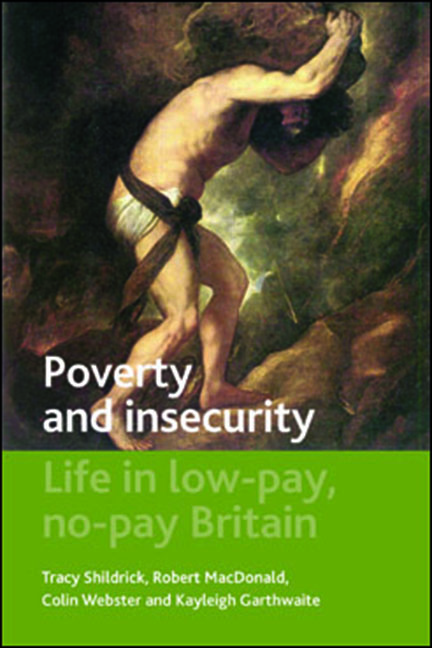Book contents
- Frontmatter
- Contents
- List of figures and boxes
- Acknowledgements
- 1 Introduction
- 2 Poor work, welfare and poverty
- 3 Researching the low-pay, no-pay cycle and recurrent poverty
- 4 The low-pay, no-pay cycle: the perspectives and practices of employers and ‘welfare to work’ agencies
- 5 The low-pay, no-pay cycle: its pattern and people's commitment to work
- 6 Searching for jobs: qualifications, support for the workless and the good and bad of informal social networks
- 7 Poor work: insecurity and churning in deindustrialised labour markets
- 8 ‘The ties that bind’: ill health and caring and their impact on the low-pay, no-pay cycle
- 9 Poverty and social insecurity
- 10 Conclusions
- References
- Index
3 - Researching the low-pay, no-pay cycle and recurrent poverty
Published online by Cambridge University Press: 07 September 2022
- Frontmatter
- Contents
- List of figures and boxes
- Acknowledgements
- 1 Introduction
- 2 Poor work, welfare and poverty
- 3 Researching the low-pay, no-pay cycle and recurrent poverty
- 4 The low-pay, no-pay cycle: the perspectives and practices of employers and ‘welfare to work’ agencies
- 5 The low-pay, no-pay cycle: its pattern and people's commitment to work
- 6 Searching for jobs: qualifications, support for the workless and the good and bad of informal social networks
- 7 Poor work: insecurity and churning in deindustrialised labour markets
- 8 ‘The ties that bind’: ill health and caring and their impact on the low-pay, no-pay cycle
- 9 Poverty and social insecurity
- 10 Conclusions
- References
- Index
Summary
Introduction
Our study was conducted in Teesside, North East England. The participants came from Middlesbrough, the main town of this large, industrial conurbation. Anecdotally, Teesside has been described variously as both a ‘research laboratory’ and a ‘policy laboratory’. It has had a fascination for research because of the speed and scope of social and economic changes as they have affected this locality, and the social problems that these have generated have been met with a multitude of successive policy interventions geared toward tackling them, as described later.
This chapter has the following aims and parts. First, we sketch the remarkable social and economic transformations of the 19th century that created Teesside as a place famous for its industry and how later, during the latter part of the 20th century, it went ‘from boom to bust in quick time’ (Foord et al, 1985). Second, we examine changing patterns and forms of employment and, particularly, how precarious work has spread where once there were better-paid, higher-skilled and more secure jobs. Third, we describe briefly the previous research projects that we have undertaken in this locality and how they are linked to this one. This helps explain the choice of the specific research sites from which we recruited participants; these neighbourhoods are described in the fourth part of the chapter. Fifth, the methods for the research are outlined, as is the sample we recruited.
Brief socioeconomic history of Teesside: the metamorphoses of a place
Understanding the birth and development of Teesside, in particular its main town of Middlesbrough, is, we think, significant in understanding its current economic fortunes and the sociological character of working-class community and lives in this place. In part, we wish to show some continuities and discontinuities in the historical development of the town.
In the 19th century Middlesbrough was the fastest-growing town in England, mushrooming from a rural hamlet with a population of 40 people in 1820 to a bustling industrial town with a population of over 90,000 residents by the end of the 19th century (it had around 140,000 residents at the time of writing, in 2012).
- Type
- Chapter
- Information
- Poverty and InsecurityLife in Low-Pay, No-Pay Britain, pp. 39 - 60Publisher: Bristol University PressPrint publication year: 2012



